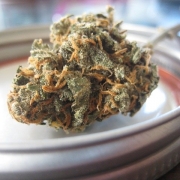How to Use Marijuana to Reduce Opioid Dependence
Opioid dependence has become a rightly concerning topic as of late. With media reports of accidental overdosing on the rise, the topic of opioid dependence has become firmly back on the agenda. With millions of people worldwide on opioid-derived painkillers for numerous medical conditions, it begs the question: are there any better alternatives available?
If you use opioid-based drugs to manage a chronic pain condition, or if you have an addiction to an opioid painkiller, there is some evidence to suggest that marijuana can help you better manage pain and reduce your opioid intake. In this blog post, we will examine the issue and highlight the key aspects of this often complex debate.
The problem with opioid dependence
Opioids are most commonly used for managing pain and are among the strongest classes of painkillers on the market. As highly addictive drugs, opioids need to be carefully managed in terms of dosage and duration of use. And with recreational use at an all-time high, addiction – and the subsequent overdosing – is on the rise.
You cannot overdose on cannabis
One of the advantages of using marijuana for pain relief as opposed to opiods is that the level of potential for addiction is far lower. Although marijuana addition is possible, cannabis is generally considered to be much less addictive than the nicotine in standard cigarettes. Another major advantage of marijuana is that the potential for an overdose is virtually non-existent. This is because the drug does not have a direct impact upon vital bodily functions, such as the ability to breathe.
Reducing opioid dependence
Recent studies have uncovered what many people have known for a while now: that cannabis does have the potential to reduce opioid dependence. An up-to-date study revealed that individuals were either able to completely stop their intake of opioids or at least reduce their dosage. Overall, the result was highly positive, with many respondents stating it has increased their quality of life.
Managing chronic pain conditions with marijuana
While cannabis has been seen to relieve pain, the different types of pain and various strains of cannabis mean the subject matter is not an exact science. Many people have found good results by using cannabis to reduce inflammatory pain. Likewise, pain from conditions such as multiple sclerosis and Parkinson’s disease have been shown to be better managed by use of marijuana.
Using cannabis alongside opioids
Introducing cannabis alongside opioids has also been shown to enhance pain relief in some instances and reduce the potential for an opiod overdose. This is because a lower dose of opioids can be used, thereby reducing the overdose threshold while maintaining adequate pain relief via cannabis. Besides pain relief, many people have experienced good results by using cannabis to overcome withdrawal symptoms.
In summary
To sum up, there is some evidence to suggest that marijuana can be effective for reducing opioid dependence. Indeed, there is also evidence to suggest that the use of marijuana in conjunction with opiods can lower the risk of overdose while maintaining a similar effectiveness of pain relief, at least in the short-term. The full potential for cannabis and pain relief has not been explored in great depth, however, and studies are usually inconclusive. Therefore, while many people agree that marijuana can help to reduce pain and become an alternative for opioids, it would be highly beneficial for more detailed scientific studies to be conducted prior to this theory being conclusive.
(via leafscience.com)









